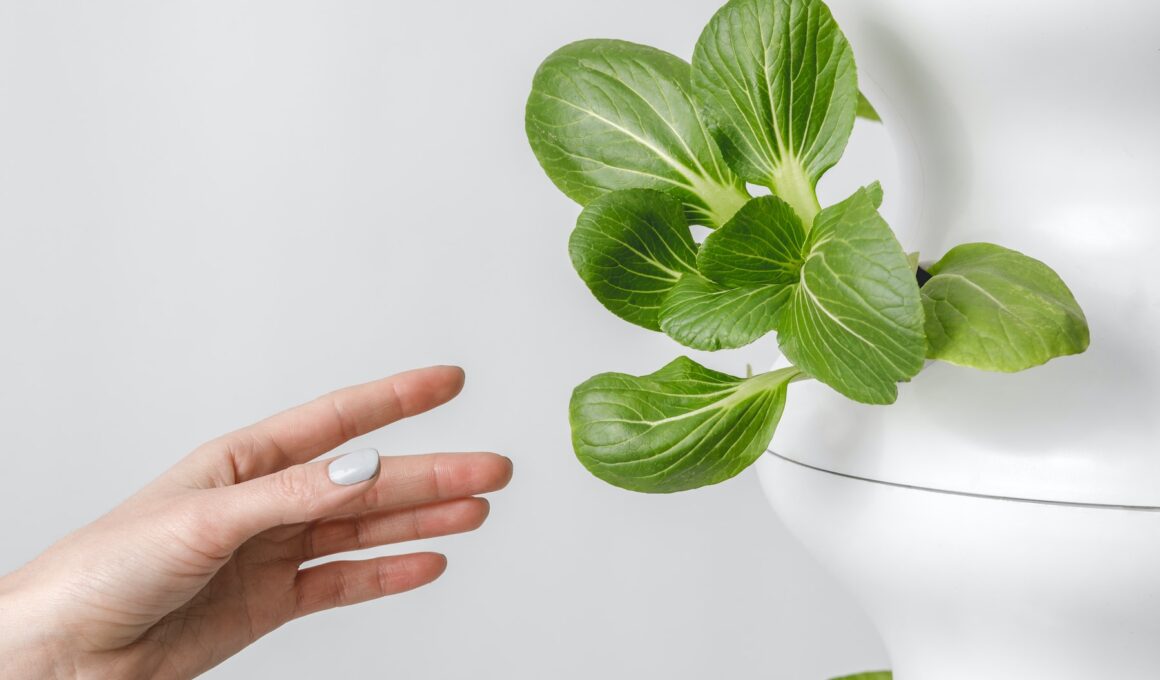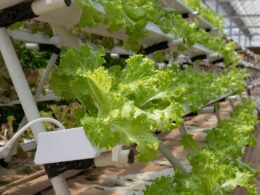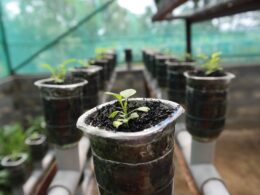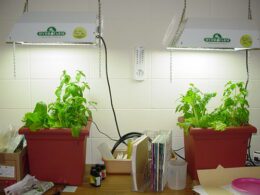Are you curious about hydroponic farming and its potential dangers?
While hydroponic farming offers many benefits, including year-round growing and reduced water usage, there are also some potential downsides that you should be aware of.
In this article, we will explore what is bad about hydroponic farming and how it may impact both the environment and your health.
Firstly, hydroponic farming relies heavily on synthetic fertilizers and pesticides to maintain plant growth and prevent pest infestations. While these chemicals are effective, they can also have negative impacts on the environment and your health.
Additionally, hydroponic systems can also be prone to nutrient and mineral deficiencies, which can affect the quality and safety of the crops produced.
By understanding these potential issues, you can make informed decisions about whether hydroponic farming is the right choice for your needs.
Overview of Hydroponic Farming
Let’s dive into the world of growing plants without soil and explore the innovative techniques used to cultivate crops in a controlled environment. Hydroponic farming is the practice of growing plants in a nutrient-rich water solution instead of soil. This approach allows for the cultivation of plants in a controlled environment, making it easier to grow crops that are not native to a particular region.
Vertical farming is one of the most popular types of hydroponic systems. It involves growing plants in stacked layers, making it an efficient use of space. This approach is particularly useful in urban areas where space is limited. The goal of vertical farming is to maximize the yield of crops while minimizing the amount of space required.
There are several types of hydroponic systems, each with its own advantages and disadvantages. Some of the most common types include nutrient film technique, deep water culture, and drip irrigation. Each system uses a slightly different approach to deliver nutrients and water to the plants.
While hydroponic farming has its benefits, there are also some potential drawbacks to consider.
Synthetic Fertilizers and Pesticides in Hydroponic Farming
Using synthetic fertilizers and pesticides in modern agricultural practices has raised concerns about their impact on both human health and the environment. Hydroponic farming is no exception, but it does not eliminate the need for synthetic fertilizers and pesticides. In fact, hydroponic farming heavily relies on these chemicals to grow crops efficiently.
The use of synthetic fertilizers and pesticides in hydroponic farming has grave environmental impacts. These chemicals can leach into the groundwater and contaminate the ecosystem, contributing to soil degradation and erosion which can lead to decreased biodiversity and soil fertility. Furthermore, these chemicals can harm beneficial insects and pollinators, which play a crucial role in maintaining a healthy ecosystem.
Health concerns are also a major issue associated with the use of synthetic fertilizers and pesticides in hydroponic farming. These chemicals can leave residues on crops, which can be harmful to human health when consumed. Long-term exposure to these chemicals has been linked to respiratory problems, neurological disorders, and cancer. Although hydroponic farming is often touted as a safer and more efficient method of farming, the use of synthetic fertilizers and pesticides raises serious concerns about the safety of the food produced.
Instead of relying on synthetic fertilizers and pesticides, organic hydroponic farming methods can be used. These methods use natural and organic materials to grow crops, thus reducing the environmental impact and health concerns associated with synthetic chemicals. As consumers, we can support these practices by purchasing food from organic hydroponic farms and advocating for sustainable farming practices that prioritize both environmental and human health.
What Are the Main Disadvantages of Hydroponic Farming?
There are a few disadvantages of hydroponic farming to consider. One issue is the high initial cost of setting up a hydroponic system, which can be a significant investment. Additionally, the need for constant monitoring and maintenance of the nutrient solutions and environmental conditions can be time-consuming. Another challenge is the potential for technical failures, such as power outages or pump malfunctions, which can lead to crop losses. Overall, understanding and addressing these disadvantages of hydroponic farming is crucial for successful implementation.
Nutrient and Mineral Deficiencies in Hydroponic Systems
Don’t miss out on learning about nutrient and mineral deficiencies that can arise in hydroponic systems!
One of the main challenges of hydroponic farming is maintaining proper pH balance in the nutrient solution. If the solution becomes too acidic or alkaline, it can lead to nutrient lockout, where plants are unable to absorb essential minerals like calcium, magnesium, and iron. This can cause stunted growth, yellowing leaves, and poor crop yields.
Another issue with hydroponic farming is the lack of natural mineral sources. In soil-based farming, minerals are naturally replenished through the breakdown of organic matter. In hydroponic systems, however, minerals must be added to the nutrient solution manually. If certain minerals are not provided in sufficient quantities, it can lead to deficiencies in plant growth and development.
For example, a lack of calcium can cause blossom end rot in tomatoes and peppers, while a lack of iron can result in yellowing leaves.
To address these nutrient and mineral deficiencies in hydroponic systems, it is important to regularly monitor and adjust the pH balance of the nutrient solution. Additionally, growers may need to supplement the nutrient solution with specific minerals to ensure optimal plant growth.
While hydroponic farming can be challenging, with proper care and attention, it’s possible to produce high-quality crops without the use of synthetic fertilizers and pesticides.
What are the negatives of using hydroponics for farming?
While hydroponics offers several benefits like efficient water usage and year-round crop production, it also has some drawbacks. One of the negatives of using hydroponics for farming is the high initial setup cost, including equipment and infrastructure. Additionally, the reliance on artificial lighting systems can increase energy consumption, leading to higher operational expenses. Despite these positives and negatives of hydroponics, it is crucial to carefully consider the financial implications before adopting this method of farming.
Don’t miss out on learning about nutrient and mineral deficiencies that can arise in hydroponic systems!
One of the main challenges of hydroponic farming is maintaining proper pH balance in the nutrient solution. If the solution becomes too acidic or alkaline, it can lead to nutrient lockout, where plants are unable to absorb essential minerals like calcium, magnesium, and iron. This can cause stunted growth, yellowing leaves, and poor crop yields.
Another issue with hydroponic farming is the lack of natural mineral sources. In soil-based farming, minerals are naturally replenished through the breakdown of organic matter. In hydroponic systems, however, minerals must be added to the nutrient solution manually. If certain minerals are not provided in sufficient quantities, it can lead to deficiencies in plant growth and development.
For example, a lack of calcium can cause blossom end rot in tomatoes and peppers, while a lack of iron can result in yellowing leaves.
To address these nutrient and mineral deficiencies in hydroponic systems, it is important to regularly monitor and adjust the pH balance of the nutrient solution. Additionally, growers may need to supplement the nutrient solution with specific minerals to ensure optimal plant growth.
While hydroponic farming can be challenging, with proper care and attention, it’s possible to produce high-quality crops without the use of synthetic fertilizers and pesticides.
Alternative Methods to Synthetic Chemicals in Hydroponic Farming
You’ll be amazed at the innovative ways that growers are finding to replace synthetic chemicals and improve the sustainability of their hydroponic operations.
One of the most popular methods is the use of organic alternatives, such as compost teas and fish emulsions. These natural products provide the necessary nutrients and minerals for plant growth, without the harmful chemicals found in synthetic fertilizers.
In addition to organic alternatives, hydroponic growers are also implementing sustainable practices to reduce their environmental impact. For example, many are using renewable energy sources like solar panels to power their operations. Some are also recycling water through closed-loop systems, which can significantly reduce water consumption and waste.
By embracing these alternative methods and sustainable practices, hydroponic farmers are able to produce high-quality produce while also protecting the environment.
So if you’re looking to start your own hydroponic operation, don’t feel limited to synthetic chemicals – there are plenty of natural options available that can help you achieve success.
Conclusion and Future of Hydroponic Farming
The exciting potential of hydroponic agriculture is constantly expanding, with new technologies and sustainable practices paving the way for a bright and fruitful future. As research and development continues, the future advancements in hydroponics are endless. Here are three reasons why the future of hydroponic farming is something to look forward to:
-
Hydroponics offers economic viability. With the world’s population constantly increasing, the demand for food is rapidly growing. Hydroponic farming allows for year-round production, maximizing crop yields and providing a consistent supply of fresh produce. In addition, hydroponic systems use significantly less water and space than traditional farming methods, making it a cost-effective and sustainable solution for food production.
-
The advancement of technology in hydroponic farming is allowing for more precise control over the growing environment. This means that crops can be grown to perfection, with the optimal amount of nutrients and light for each plant. This level of precision also means that less waste is produced, as the exact amount of resources needed for each crop can be determined and applied.
-
Hydroponic farming is a solution for global food security. With the ability to grow crops in areas with limited arable land and harsh climate conditions, hydroponic farming has the potential to provide fresh produce to underprivileged communities. As the world’s population grows and climate change presents challenges to traditional farming methods, hydroponic farming may become an increasingly important solution for feeding the world.
The future of hydroponic farming is bright, with endless potential for economic viability, technological advancements, and global food security. As research and development continues, the possibilities for this sustainable and efficient farming method are endless.
Frequently Asked Questions
What are the potential health risks associated with consuming crops grown using hydroponic farming techniques?
If you’re looking for an alternative way to grow your produce, hydroponic farming might be an option you’re considering. However, it’s important to note that there are potential health risks associated with consuming crops grown using hydroponic farming techniques.
One of the biggest concerns is the potential for contamination, as hydroponic systems are often housed in enclosed spaces where bacteria and other harmful substances can thrive. Additionally, hydroponic farmers may use pesticides to control pests and diseases, which can also pose health risks to consumers.
It’s important to be aware of these potential risks and to research the specific hydroponic farming practices of the producer before making a decision to consume their produce.
How does hydroponic farming impact the environment compared to traditional soil-based agriculture?
When it comes to environmental impact, hydroponic farming has both advantages and disadvantages compared to traditional soil-based agriculture.
On the one hand, hydroponic systems can use up to 90% less water than soil-based systems, making them more sustainable in water-scarce regions. Additionally, they can be grown in urban areas, reducing transportation costs and carbon emissions.
However, the energy required to power the artificial lighting and climate control systems used in hydroponic farming can be significant, leading to increased carbon emissions and environmental impact. To mitigate these effects, many hydroponic farms are implementing sustainability practices such as using renewable energy sources and recycling nutrient-rich water.
What are some of the challenges in implementing hydroponic farming on a large scale?
Challenges in implementing hydroponic farming on a large scale are numerous, as this method of agriculture requires a substantial amount of resources and specialized expertise.
One of the biggest challenges is scalability, as it can be difficult to create a hydroponic system that can be easily replicated and expanded to meet the needs of a large population.
Other challenges include the need for precise monitoring and control of environmental factors such as temperature, pH, and nutrient levels, as well as the high cost of equipment and infrastructure.
Despite these challenges, many experts believe that hydroponic farming has the potential to revolutionize food production and address some of the environmental challenges facing traditional agriculture.
How do hydroponic farming methods affect the taste and nutritional quality of crops compared to those grown in soil?
When it comes to taste comparison and nutritional value difference, crops grown through hydroponic farming methods might not be the best option.
While hydroponic farming allows for precise control of the growing environment, it can also lead to crops with a less robust flavor and lower nutritional value compared to those grown in soil.
The lack of exposure to natural elements and nutrients in the soil can prevent the crops from developing the same depth of flavor and nutrient content as their soil-grown counterparts.
However, this doesn’t necessarily mean hydroponic farming is bad – it simply highlights the importance of considering the trade-offs between precision and taste/nutrition when choosing a method of farming.
Are there any social or economic concerns associated with the widespread adoption of hydroponic farming?
When it comes to the widespread adoption of hydroponic farming, there are certainly social implications and economic feasibility concerns to consider.
On the one hand, hydroponic farming can provide a more sustainable and efficient way of growing crops, which could potentially benefit communities in food-insecure areas.
However, there are also concerns around the potential displacement of traditional farming communities, as well as the concentration of ownership and control over food production in the hands of a few large corporations.
Additionally, there are questions around the long-term economic viability of hydroponic farming, particularly given the high startup costs associated with this method.
Despite these concerns, there is no denying that hydroponic farming has the potential to play an important role in the future of agriculture, and it’ll be up to policymakers and industry leaders to ensure that its adoption is balanced and equitable.
Conclusion
Now that you know about hydroponic farming, you might be wondering if it’s a good choice for you. While hydroponic farming has its benefits, there are also some downsides to consider.
One of the biggest concerns is the use of synthetic fertilizers and pesticides, which can harm the environment and potentially affect human health. In addition, hydroponic systems can be prone to nutrient and mineral deficiencies, which can impact the quality and quantity of crops.
However, there are alternative methods to synthetic chemicals that can be used in hydroponic farming, such as organic fertilizers and integrated pest management, which can help mitigate these issues. Ultimately, the future of hydroponic farming will likely involve finding ways to address these challenges and make the practice more sustainable and environmentally friendly.









